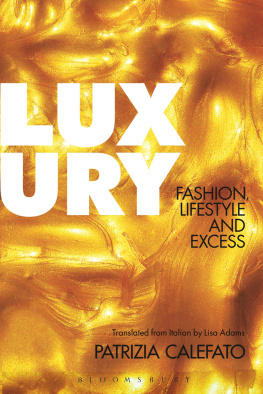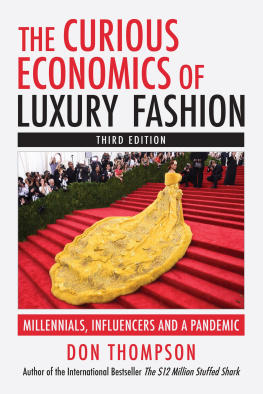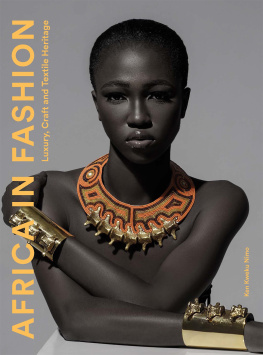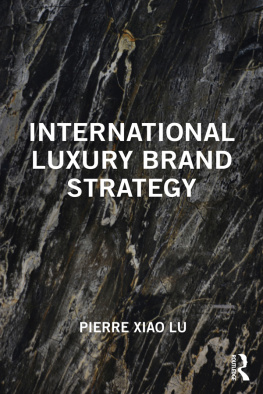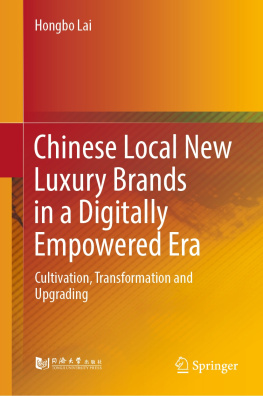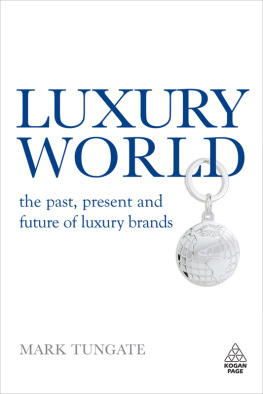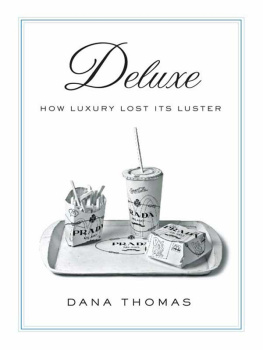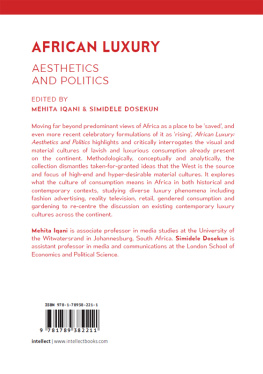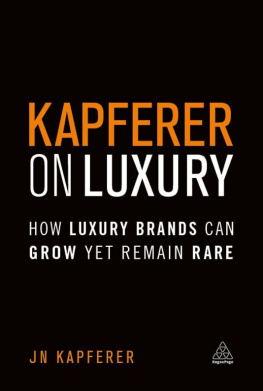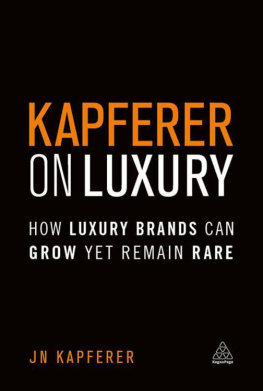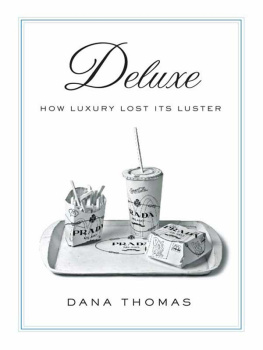Luxury
Luxury
Fashion, Lifestyle and Excess
Patrizia Calefato
Translated from Italian by Lisa Adams

Bloomsbury Academic
An imprint of Bloomsbury Publishing Plc
| 50 Bedford Square | 1385 Broadway |
| London | New York |
| WC1B 3DP | NY 10018 |
| UK | USA |
www.bloomsbury.com
Bloomsbury is a registered trade mark of Bloomsbury Publishing Plc
First published 2014
Patrizia Calefato, 2014
Patrizia Calefato has asserted her right under the Copyright, Designs and Patents Act, 1988, to be identified as Author of this work.
All rights reserved. No part of this publication may be reproduced or transmitted in any form or by any means, electronic or mechanical, including photocopying, recording, or any information storage or retrieval system, without prior permission in writing from the publishers.
No responsibility for loss caused to any individual or organization acting on or refraining from action as a result of the material in this publication can be accepted by Bloomsbury or the Author.
British Library Cataloguing-in-Publication Data
A catalogue record for this book is available from the British Library.
ISBN: 978-0-8578-5333-2
Library of Congress Cataloging-in-Publication Data
Calefato, Patrizia.
[Lusso. English]
Luxury : fashion, lifestyles and excess / Patrizia Calefato ; translated by Lisa Adams.
pages cm
Includes bibliographical references and index.
ISBN 978-0-85785-331-8 (pbk.) ISBN 978-0-85785-330-1 (hardback) ISBN 978-0-85785-332-5 (epdf) ISBN 978-0-85785-333-2 (epub)1. LuxurySocial aspects.2. Consumption (Economics)Social aspects.3. LuxuriesSocial aspects.4. FashionSocial aspects.I. Title.
HB841.C2513 2014
306.3dc232013045223
Contents
NEW LUXURY
The word luxury has never seemed more irrelevant than now, in a time of crisis, as our consciences view the theater and players of global poverty and wealth. Without doubt, while civilizations and cultures engage in new conflicts and while the need for solidarity with another possible world grows, we can only view with disdain a concept that condones the possession and ownership of things. Luxury is based on painful expropriations and makes even more explicit the global dislocations of production processes today, which result in new forms of impoverishment and enslavement. These production processes, on the one hand, and the serial standardization of objects and bodies-as-cash, where technological biopower is exercised, on the other, mean that an irrelevant concept like luxury is now associated more with the idea of a rupture in the midst of life than with the idea of ostentatious expenditure denoting social status. Biopower, in Michel Foucaults definition, includes all the strategies and techniques of the management and regulation of power over life and death that were devised in the second half of the eighteenth century and that have replaced the sovereigns power over life and death. Biopower is articulated in disciplines that control and legislate the individuals everyday gestures, attitudes, and behavior, as well as in forms of social control over biological aspects, sexuality, procreation, illness, and accidents; in short, over the whole living human body (see Foucault [1997] 2003: 239). The classical forms of biopower described by Foucault, together with the new global configurations of domination and the new technologies (including reproductive technologies), are today confirmed and empowered by the social order.
In his Theory of the Leisure Class Thorstein Veblen gives us the classic definition of conspicuous consumption as symbolically honorific behavior denoting wealth:
Throughout the entire evolution of conspicuous expenditure, whether of goods or of services or human life, runs the obvious implication that in order to effectually mend the consumers good fame it must be an expenditure of superfluities. In order to be reputable it must be wasteful. ([1899] 2007: 49)
Veblen also coined the expression conspicuous waste, which carries an implicit sense of blame (51). With the notion of leisure class Veblen basically refers to the upper-middle class of his day, in which he also identifies traits, tastes, and lifestyles rooted in earlier periods. While display and conspicuous consumption remain an ignominious brand for those who exploit expensive commodities as a mark of prestige and power, the notion of luxury in the twenty-first century has to do instead with subtler categories and with emotions that are conscious of the play of signs in which luxury is placed. Luxury is not inclined to be trapped in the affectation of the newly rich; luxury goods are quite disconnected from labor.
In the name of reason, frugality, morality, or rhetoric, the enemies of luxury have condemned its excesses throughout history and across social boundaries, thereby attacking the essence of luxury itself, which arises from the idea of an expenditure that cannot be contained either in equal forms of exchange or as the response to a necessity. However, great turning points in history have always been accompanied by a perception of the importance (or indeed necessity) of luxury. In the modern age, eighteenth-century Europe witnessed a philosophical debate in France on the meaning of luxury in which intellectuals such as Denis Diderot, Charles-Louis de Montesquieu, and Etienne Bonnot de Condillac took part. There was even an entry on luxury in the Encyclopdie, attributed to Jean-Franois de Saint-Lambert. At the root of the philosophical debate on the reasons for the social necessity of luxury there is, as Carlo Borghero suggests, the metaphor in the Fable of the Bees, recounted at the beginning of the eighteenth century by the Dutch physician and philosopher Bernard de Mandeville and later translated into French: The fable tells of a rich and prosperous beehive in which the bees live in ease and luxury. The insects do everything that men do: they exercise the same professions, have the same institutions that regulate their lives and their actions are motivated by the same passions: greed, lust and pride (Borghero 1974: xviii). At a certain point some of the insects appeal to Jove and ask him to end this state of affairs and to set up rules akin to sumptuary laws; once set up, however, these laws create a situation of complete deprivation in the beehive. The paradoxical moral of the fable is that luxury is necessary for the good of a nation; it is not waste, hedonism, or wantonness, but is profoundly tied to the very nature of humankind.
expenditure, futile excess, and the realm of the nonfunctionalis not only specifically associated with capitalism but is an essential component of being human.
Franois Pouillon (1979: 584) writes that today the notion of luxury exists on the fringes of economic research and has been disappearing in contemporary thought. This theory is based on Webers vision of the capitalist ethic as the ethic of bourgeois Calvinist thrift, as opposed to the ostentation and waste typical of the aristocracy. The Protestant ethic that Weber saw as the basis of capitalist accumulation does not contemplate squandering, waste, or enjoyment as an end in itself, which are all typical of luxury in its most canonical forms. Instead, it is oriented toward frugality, utility, and duration. However, Sombart rather than Weber turns out to be more long-sighted with his unusual yet illuminating theory of the necessity of luxury. He anticipated what would happen in the twentieth century, as products have become signs in an increasingly massified society, and as values like ostentation and distinction (closely related to luxury) have assumed a leading role in the irreversible epoch-making transitions we are experiencing today.
Next page
